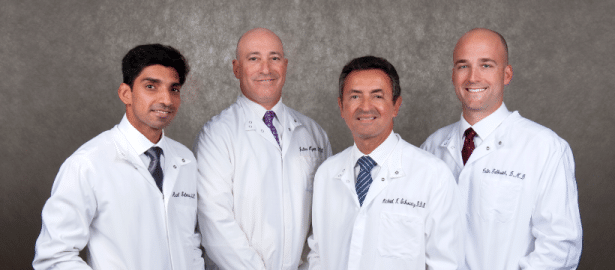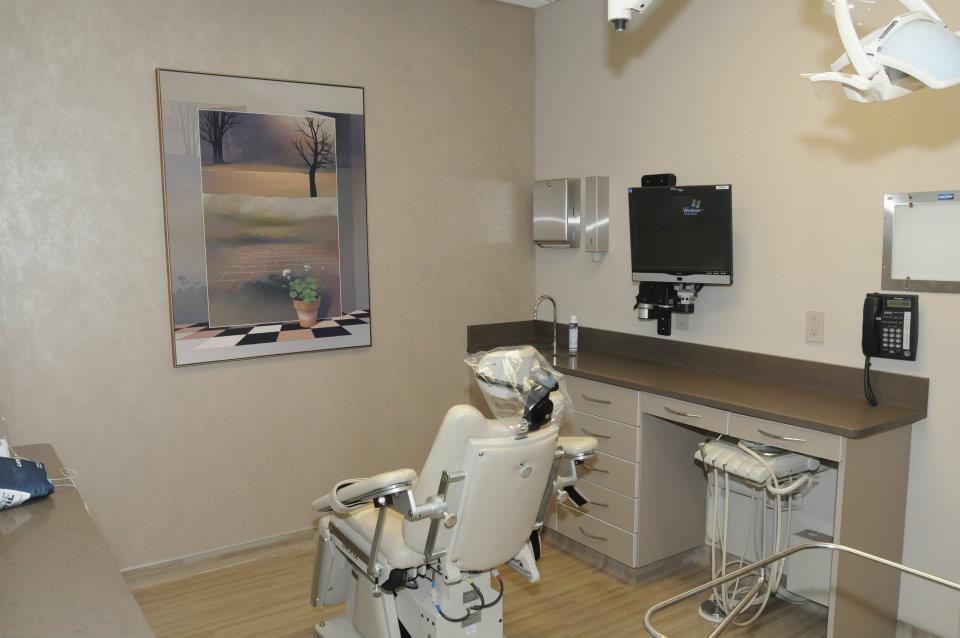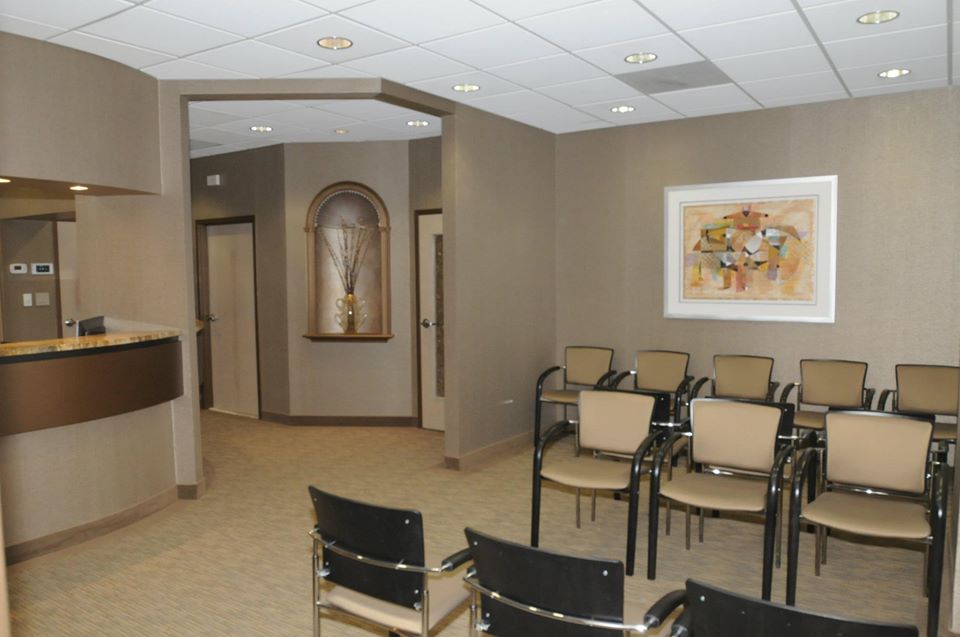Dr. Schwartz has won acclaim from Baltimore Magazine for being one of the area’s most outstanding surgeons. Dr. Schwartz has practiced as a Board Certified Oral and Maxillofacial Surgeon in the Baltimore area for over thirty years. After graduating first in his class at Northwestern University, he served as assistant resident in the Department of Anesthesia and Critical Care Medicine at Johns Hopkins Hospital during his residency in Oral and Maxillofacial Surgery.
Dr. Schwartz prioritizes patient comfort, staying up-to-date with the latest technology to enhance aesthetic and functional procedures. His approach to treatment rests on his extensive experience and continued pursuit of expanded options for patient comfort.
Expertise in Dental Implants
Dr. Schwartz has placed dental implants and performed bone grafts for thousands of patients over the course of his career as an oral surgeon. He is both an accomplished Baltimore oral surgeon and a nationally recognized specialist.
Dr. Schwartz provides continuing education for the dental community in the Baltimore area, introducing the latest advancements in dental implant techniques. Previously, he served as an assistant professor for the Oral and Maxillofacial Surgery residency program at the Johns Hopkins Hospital and as the principal investigator in numerous pain medication research studies.
Professional Organizations
Dr. Schwartz is a Diplomate of the American Board of Oral and Maxillofacial Surgery as well as Fellow of the American Association of Oral and Maxillofacial Surgeons, and Fellow of the American College of Oral and Maxillofacial Surgeons. He is a member of numerous other professional organizations for oral surgeons, including:
- American Dental Association.
- Middle Atlantic Society of Oral and Maxillofacial Surgeons.
- Maryland State Dental Association.
- Institute for Dental Implant Awareness.
Dr. Schwartz has developed a professional network to exchange information about the effectiveness of treatment methods and their viability in practice.
Community and Family
Dr. Schwartz and his wife Elisa have two sons, Ryan and Evan. When he is not focusing on his professional development and patient care, he enjoys spending time with his family, boating, wine tasting, playing tennis, and skiing. Dr. Schwartz is committed to community service and is currently on the board of the Maryland Chapter of the Cystic Fibrosis Foundation.
Dental Implants :
 Your tooth is made up of two parts – the root, which is embedded in your jawbone, and the crown, which is the part of the tooth you can see. When a tooth is lost or removed, the bone that previously surrounded the tooth root begins to resorb, or deteriorate.
Your tooth is made up of two parts – the root, which is embedded in your jawbone, and the crown, which is the part of the tooth you can see. When a tooth is lost or removed, the bone that previously surrounded the tooth root begins to resorb, or deteriorate.
Dental implants are basically substitute tooth roots that function like a natural tooth roots, stimulating bone growth and providing a strong foundation for replacement teeth.
Why Are Dental Implants the Preferred Method of Tooth Replacement?
Dental implants have become the preferred method of tooth replacement for several important reasons:
- No other treatment option prevents the bone resorption/deterioration that occurs when a tooth is lost or removed.
- This is the only tooth replacement option that preserves the adjacent teeth, as opposed to cutting them down to place a bridge or hooking a partial denture to them.
- Dental implants have by far the best long-term success rates of any treatment option – and this has been documented in the scientific literature for over four decades.
- Since dental implants are designed to last a lifetime, there is rarely a need for additional treatment. With other forms of tooth replacement that need to be replaced every 5 to 10 years, additional dentistry is almost always necessary in the future. As a result, dental implant treatment is the most cost-effective option long-term.
Can Dental Implants Be Used to Replace Multiple Teeth?
Dental implants are very versatile and can be used to replace a single tooth, multiple teeth or all of the teeth. Baltimore patients may require additional procedures to obtain the optimal esthetic and functional outcome.
A surgical evaluation and consultation with one of the oral surgeons at the Maryland Center for Oral Surgery and Dental Implants will determine whether you are a candidate for dental implant treatment and whether additional procedures, such as bone grafting will be necessary.
Benefits of Dental Implants :
While there are other treatment options for replacing missing teeth, dental implants have numerous unique benefits for patients:
Designed to Last a Lifetime. Because dental implants are designed to last a lifetime, they have a better long-term success rate than any other tooth replacement option. Documented clinical research demonstrates that dental implants have a success rate of over 95%, which is significantly higher that tooth-supported bridges and partial or full dentures.
Preserves Bone and Facial Structures. Bone resorption, or deterioration, is one of the most serious consequences of missing teeth. By replacing the root of your tooth with a dental implant, your jawbone and smile retain their shape. If you are missing all of your teeth, replacing them with implant-supported replacement teeth will preserve the integrity of your facial structures and prevent the shrinkage of your jaws and the appearance of a collapsed face.
A Healthier Smile. Tooth-supported bridges and partial dentures can damage your teeth over time. With dental implants, it is not necessary to cut the adjacent down to place a bridge, which compromises the long-term health of the teeth, or hook a partial denture onto natural teeth, which can cause them to loosen to the point where they have to be removed.
Natural Appearance. Dental implants were developed to replicate the appearance of your natural teeth – and preserve your bone to maintain the natural appearance of your smile. Your surgeon will be able to place the dental implants in the precise position to enable your dentist to create a beautiful crown that matches the shape and shade of your natural teeth.
More Hygienic and Easier to Maintain. Caring for a single dental implant is basically the same as caring for a natural tooth. You’ll be able to brush and floss your implant-supported tooth. Your hygienist will clean your new implant crown during your regular hygiene maintenance appointment.
Ultimately, dental implants will function the same way as your natural teeth, allowing you to smile with confidence and enjoy any type of food.
What Will Happen During My Surgical Evaluation for Dental Implants?
Baltimore area patients will require a surgical evaluation and consultation to evaluate their situation to determine if they are candidates for dental implant treatment, and to develop the ideal treatment plan based on their individual needs.
Dentists throughout Baltimore and Harford County refer their patients to the Maryland Center for Oral Surgery & Dental Implants because the Board Certified Oral Surgeons are some of the most experienced dental implant surgeons in the country.
During your consultation, your surgeon will determine the:
- Quality and quantity of available bone
- Number of dental implants needed to create the optimal result
- Other procedures that may be necessary to prepare the surgical site
The Maryland Center for Oral Surgery & Dental Implants utilizes leading edge technology, such as 3D cone beam imaging to obtain the most accurate, detailed view of your teeth, bone and facial structures for the most precise diagnosis and treatment planning available.
How Are Dental Implants Placed and Restored?
Once your surgeon has developed your ideal treatment plan and determined whether you need additional procedures to obtain the optimal end result, you’ll be ready to schedule your surgical procedures.
If the tooth to be replaced has not yet been removed, your first surgical procedure will be to remove the tooth. If you do not have sufficient bone for a dental implant, you will need bone grafting to add bone to the site where the implant will be placed. In certain cases, the tooth removal and bone graft can be completed at the same time as the implant placement. In other cases, the implant will be placed several weeks after the surgical removal of the tooth and bone graft.
 Implant Placement. Your surgeon will administer anesthesia to prevent any sensation during surgery. Utilizing a gentle technique, your surgeon will prepare the surgical site and place the dental implant in the proper position. A small cover screw will then be attached to the implant. A temporary replacement tooth (or set of teeth) will be inserted following surgery. The implant will be left undisturbed for a several weeks to a few months, to allow the bone to remodel around the implant.
Implant Placement. Your surgeon will administer anesthesia to prevent any sensation during surgery. Utilizing a gentle technique, your surgeon will prepare the surgical site and place the dental implant in the proper position. A small cover screw will then be attached to the implant. A temporary replacement tooth (or set of teeth) will be inserted following surgery. The implant will be left undisturbed for a several weeks to a few months, to allow the bone to remodel around the implant.
 Abutment Attachment. Once the bone has fused to the implant and formed a strong biological bond, you will return to the surgeon’s office to have a small connector post attached to each implant. Your new replacement teeth will be attached to theses abutments. Your surgeon and dentist will determine the best abutment to use for your case. This is often a custom abutment, which is utilized to enable your dentist to design the ideal shape of your replacement teeth.
Abutment Attachment. Once the bone has fused to the implant and formed a strong biological bond, you will return to the surgeon’s office to have a small connector post attached to each implant. Your new replacement teeth will be attached to theses abutments. Your surgeon and dentist will determine the best abutment to use for your case. This is often a custom abutment, which is utilized to enable your dentist to design the ideal shape of your replacement teeth.
 Replacement Teeth. The final phase of treatment is designing and fabricating the final replacement crown, bridge, or set of teeth. Your dentist will take impressions of your teeth and the abutments and send them to a dental technician, who will create the replacement teeth. Your dentist will also determine the best shade to match your natural teeth. Once the technician has fabricated your new teeth, your dentist will attach them to the abutments, completing your treatment.
Replacement Teeth. The final phase of treatment is designing and fabricating the final replacement crown, bridge, or set of teeth. Your dentist will take impressions of your teeth and the abutments and send them to a dental technician, who will create the replacement teeth. Your dentist will also determine the best shade to match your natural teeth. Once the technician has fabricated your new teeth, your dentist will attach them to the abutments, completing your treatment.
The Board Certified Oral Surgeons at the Maryland Center for Oral Surgery & Dental Implants are considered among the top specialists in the region and will support Baltimore patients with exceptional care throughout their treatment.
What is a dental implant?
A dental implant is replacement for a tooth root. It preserves bone and provides a stable foundation for a crown. Dental implants are made of titanium, which is a biocompatible material used in orthopedic implants.
What are the advantages of dental implants?
Dental implant treatment is a long-term solution for missing teeth. Bridges need to be replaced every 10-15 years. Partials and dentures need to be relined, repaired and replaced every few years.
Dental implants prevent the bone deterioration that results from loss or removal of teeth, preserving the natural appearance of the smile.
Dental implant treatment does not involve the adjacent teeth, so the health of the teeth is not compromised.
Will my new teeth look natural?
Your new teeth will look like natural teeth. Since dental implants prevent bone resorption, there will not be a defect in the bone that can compromise the appearance of your smile.
How long do that teeth last?
Clinical research documents long-term success rates of over 95%, which is much higher than success rates for other treatment options for replacing teeth. Research demonstrates that a supported bridge lasts about 7-10 years and that partials and dentures about 5 years.
Dental implants are designed to be permanent, although there are many factors that impact the long-term success, including regular maintenance and home care.
Do dental implants ever fail?
Dental implant treatment is very predictable, with a success rate of over 95%. However, on rare occasions the bone does not fuse to the implants. When this occurs, the implants must be replaced. The documented success rates for the new implants are higher than 95%.
How do I know if I am a candidate for dental implant treatment?
Anyone in general good health is usually a candidate for dental implant treatment. There are a few medical conditions, such as uncontrolled diabetes that can lower the success rates, but there are very few conditions that would prevent you from having dental implants.
The quality and quantity of bone in the area where implants are to be placed is more often a factor in determining whether you are a candidate for the procedure than medical conditions. However, even if you have lost a significant amount of bone, you can still have dental implants with additional bone grafting procedures.
How long does the implant process take?
If your situation is not complex, it usually takes several weeks to few months to complete treatment. If you are missing all of your teeth or have lost a significant amount of bone, it can take six to nine months.
Is the implant procedure painful?
Although everyone has a different threshold for pain, most patients are comfortable simply taking something as mild as Tylenol or Advil for any discomfort. In fact, many patients report that the discomfort was barely noticeable.
How much do dental implants cost?
Most people assume that there is a set cost for each implant. However, there are several factors that determine the final cost of treatment, including the number of teeth being replaced, the type of replacement teeth, and any additional procedures necessary to achieve the ideal functional and aesthetic results.
The fees are calculated based on the amount of time your dentist and surgical specialist anticipate spending to complete treatment, the cost of the dental implants and other components, as well as dental laboratory fees. There is a fee for the surgical portion of treatment (implant placement, bone grafting) and a separate fee for the restorative treatment (fabrication of replacement teeth).
The fee for dental implant treatment is usually comparable to other methods of tooth replacement; however, it is much more cost effective than other options, which need to be replaced every 5-10 years.
Are dental implants covered by dental insurance?
Insurance coverage for dental implants depends entirely on the individual policy. Benefit coverage is determined strictly by the amount paid for the policy and there are restrictions and limitations with most plans.
Dental benefit plans are designed to cover minimal basic care. The insurance companies use statistical data to set their own “usual and customary fee” schedule and there is an annual maximum benefit of $1,000-$1,500 on most plans.
Many plans exclude dental implants as a covered benefit, while others pay the same benefit as the lowest cost alternative treatment option (partials and dentures). When dental implants are a covered benefit, the coverage is still limited to the annual maximum of the policy.
Are dental implants covered by medical insurance?
Medical insurance sometimes covers people who have medical conditions as a result of complete tooth loss. There is also benefit coverage for some bone grafting procedures. Other than these specific situations, coverage is rare.
Accidents and work-related injuries are sometimes covered by insurance. Medicare does not cover implant treatment. For most patients, it is best to assume that medical insurance will not cover dental implant treatment.







